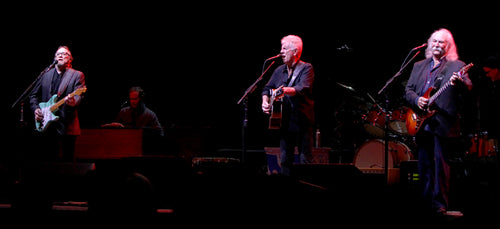
Tue, Mar 25, 14
Crosby, Stills & Nash play perfect blend of old and new at the Fox in Atlanta
courtesy of examiner.com
Crosby, Stills & Nash held a full Fox theatre audience spellbound for almost three hours on Saturday night providing an evening of entertainment that was a perfect blend of old and new music, solo and collabor
Few bands evoke the spirit of the late sixties and the anti-Vietnam war culture, as much as Crosby, Stills & Nash. Their rage at the futility of the military action in Vietnam and their outspoken perspective on its impact on the people in the United States galvanized a generation. Their use of song as protest was not new but their pointed and explicit sentiment came to personify the anti-war counter-culture in the United States at that time.
While they might have been a product of the late 1960's they haven't stayed there; their new music has much of the same powerful and emotive sentiment delivered in the same manner; with artful and peaceful, relaxing, harmonies.
By the same token, their political activism has remained at the forefront of their identity and their dissatisfaction of the current government and media came through both in some of their harder-edged political songs and their narrative between songs.

The evening was a perfect blend of old and new music and provided the band members the opportunity to play some of their own music produced independently of the others.
Not only was it old and new the evening provided a dramatic breadth of musical style with Steven Stills hard-rocking "Treetop Flyer" being offset by softer melodic ballads like Graham Nash's "Here For You" or David Crosby's "What Makes It So?" The jazzy Deja-Vu allowed for some exemplary solos by all the band members but most effective was Graham Nash's harmonica.
The evening was split into two sets with a twenty-minute intermission. Backed by five other band members the highlights of the first set included a great version of "Southern Cross" dominated by their acoustic guitars and harmonies. It also included "Cathedral", a nod to Steven Stills' days in Buffalo Springfield with "Bluebird" and a tribute to Levon Helm with "Back Home" a Graham Nash composition that ended with a refrain from The Band's "The Weight".
The second set started with a series of five or six songs that emphasized solo performances with simple arrangements and it was this part of the show that provided the most impact because of its simplicity. The respectful audience focused on listening closely to the individual band members talents. Crosby showcased "What Makes It So?" a song that he wrote right after his latest album had been "shrink-wrapped", Graham Nash sung a beautiful ballad "Here For You" and Steven Stills performed his 1991 release "Treetop Flyer".
This part of the evening provided music at its strongest as it emphasized acoustic instrumentation and harmonies or simpler electric based guitars. For example "Treetop Flyer" performed by Steven Stills, in a very simple arrangement, was raw and powerful as was the a cappella "What Are Their Names?" with just Graham Nash and David Crosby harmonizing.
On other songs with too many instruments the sound became a little muddied and lacked clarity that, at times, detracted from the vocals. "Burning For The Buddha" a new song with a strong hard-edged political message, lost some of its impact because the arrangement over-powered and clouded some of the vocals.
Overall, the night provided a tribute to their past with several of their most commercial hits including "Teach Your Children", "Our House" and "Southern Cross" providing the foundation for some of their lesser-known hits from the early seventies and their newer material. While the past was acknowledged the refreshing aspect of the evening was the desire on the band's part to play and emphasize their newer material.
While the evening blended music from the past and present the encore took everyone back to 1969 and one of their biggest hits and most enduring and timeless songs. "Suite: Judy Blue Eyes" provided the perfect end to evening.
The song, and the evening, demonstrated that while Crosby, Stills & Nash have aged, they have lost of none of their musical abilities or harmonizing skills. Furthermore their music, whether it was written at the time of the Vietnam War or more recently remains relevant and engaging.
